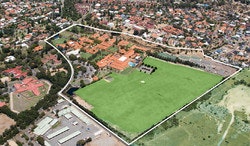Year 11 ATAR Politics and Law
Overview
A knowledge of Australia's political and legal systems is essential to enable us to become fully involved and effective citizens of our nation. Politics looks at the structures and processes through which individuals and groups make decisions whilst the study of law examines our system of laws governing the conduct of our society. The study of Politics and Law contributes to the students' intellectual, social and ethical development and challenges students to critically examine the effectiveness of political and legal systems, as well as positioning students to be more effective participants in our society.
Unit 1:
Democracy and the rule of law
- The roles of the legislative, executive and judicial arms of government
- Structures of political and legal systems including at least one democratic and one non democratic system
- The key external influences on the structure of Australia's political and legal system
- Types of laws made by parliament, courts and other authorities
- Legislative processes at state and national level
- The court hierarchy
- Statutory interpretation and precedent
- Key processes of criminal and civil trials in Western Australia
- Contemporary issues involving the legislative process and the judicial process.
Unit 2:
Representation and justice
- Political representation - theory and practice
- The Western Australian and Commonwealth voting systems
- The advantages and disadvantages of Australia's electoral and voting systems
- An electoral system of another country
- Ways that individuals, political parties and pressure groups can participate in Australia's electoral processes
- Strengths and weaknesses of Western Australia's civil and criminal law processes
- Strengths and weaknesses of a non-common law system's processes and procedures
- Political and legal issues: Issues relating to representation and to justice
- Reform of electoral and voting systems
- Reform of criminal and civil trial processes.
Assessment
There are five main types of assessment in the ATAR Politics and Law course. These are:
|
Assessment Type
|
Detail
|
Weighting
|
|
Investigation
|
Research, including hypothesis testing, analysis of sources
|
10%
|
|
Short Answer
|
Typically a series of closed questions that require definitions, explanation, comparison completed under test conditions
|
20%
|
|
Essay
|
Typically a response to a question or statement completed under test conditions.
|
20%
|
|
Source Analysis
|
Examination of source materials such as statistics, opinion polls, newspaper reports, internet sites, political speeches
|
20%
|
|
Examinations
|
The exam comprises a combination of short answers, source analysis and essays
|
30%
|
Reporting
A grade will be assigned following the completion of the course unit.
|
Grade
|
Interpretation
|
|
A
|
Excellent achievement
|
|
B
|
High achievement
|
|
C
|
Satisfactory achievement
|
|
D
|
Limited achievement
|
|
E
|
Very low achievement
|
Each grade is based on the student's overall performance for the course unit as judged by reference to a set of pre-determined standards. These standards are defined by grade descriptions.
Student Expectations/Homework
Students will be expected to complete approximately 3 hours of homework each week. This time should be spent consolidating material covered in class as well as any assigned tasks.
